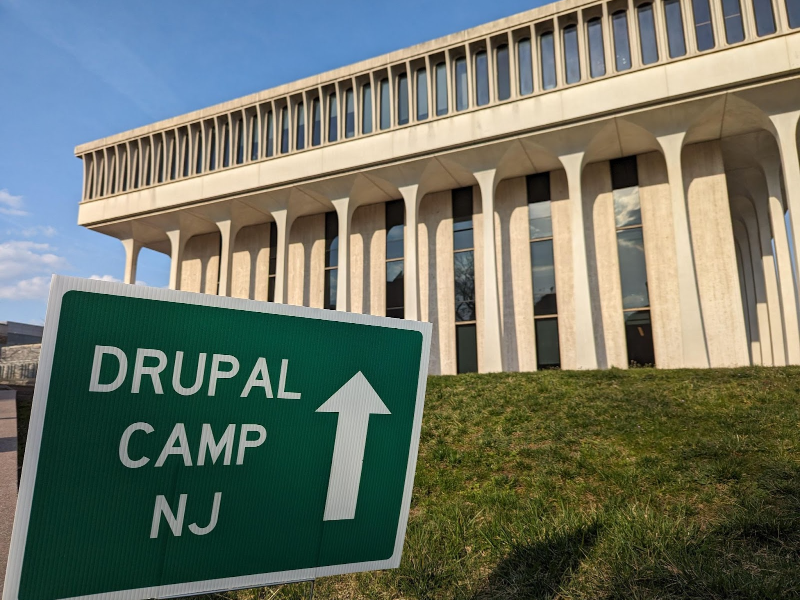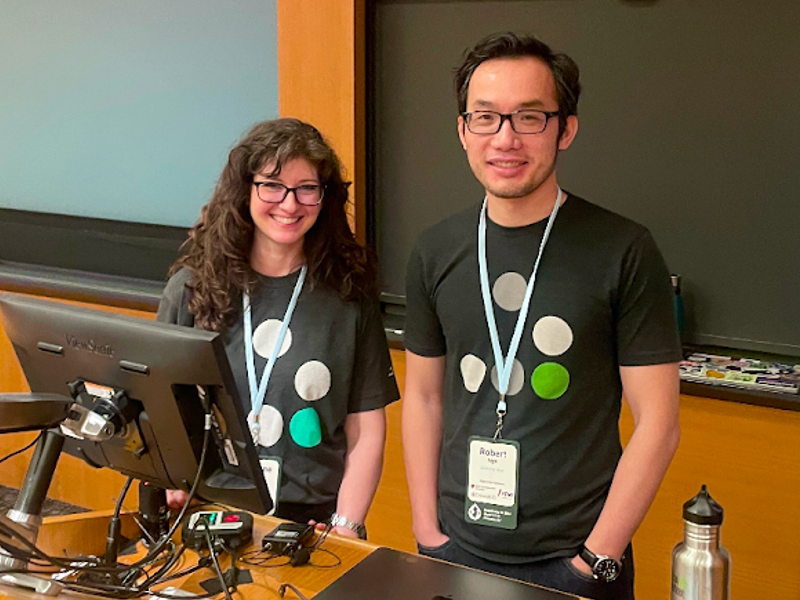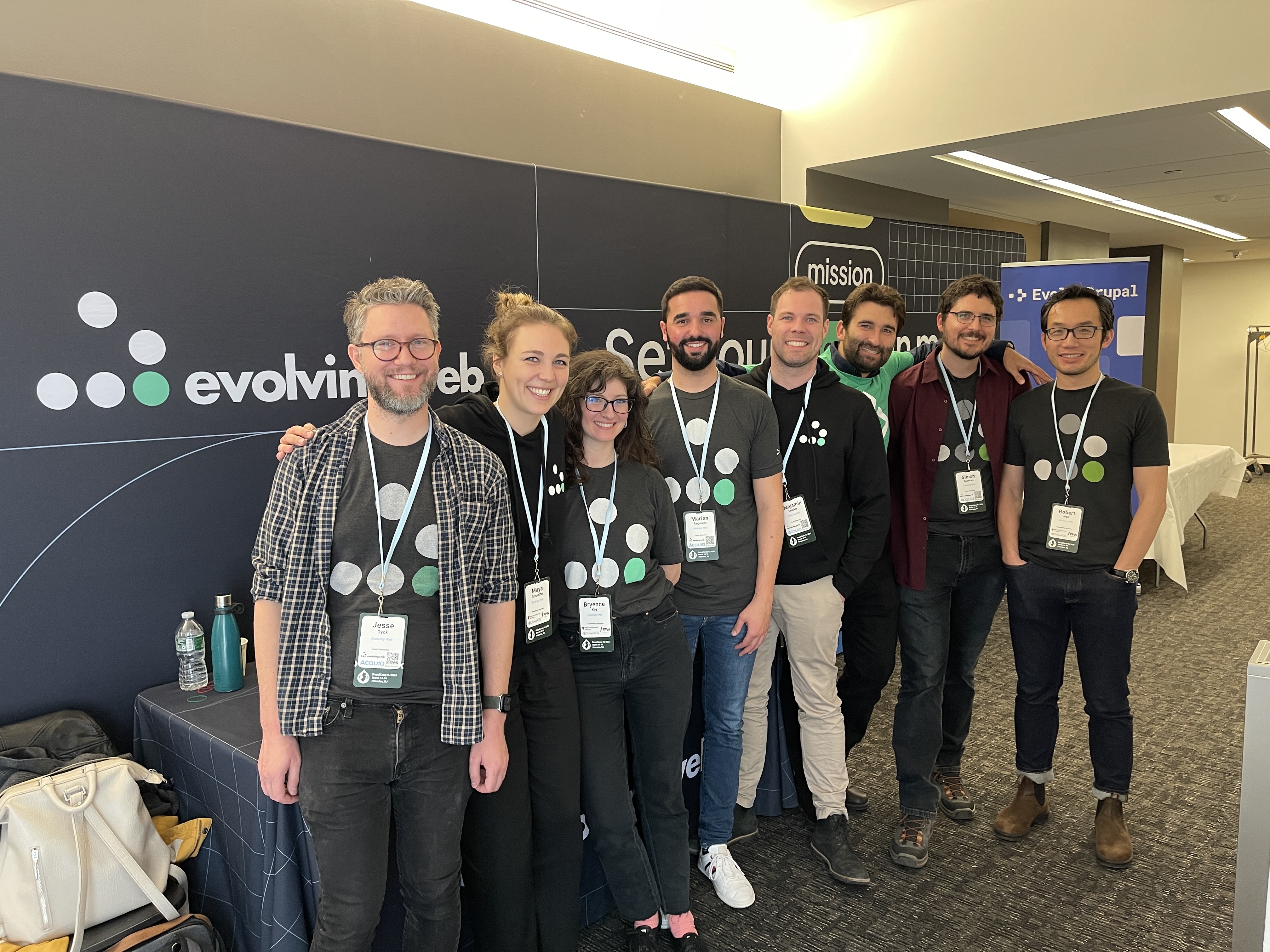DrupalCamp New Jersey unites hundreds of attendees with varying professional backgrounds to share their knowledge, ideas, and passion for the Drupal project. My first DrupalCamp NJ was in 2023 and it was also my first experience of presenting at a conference! It was a nerve-wracking but fun experience—and since then I’ve delivered 9 conference presentations across Canada, the U.S., and France on topics like accessibility, caching, migrations, and discovery.
Fast forward to March 2024: I returned to DrupalCamp NJ to present another session and deliver training. Eight of our team members piled into a minivan to make the 700 km road trip from Montreal to New Jersey. The event was held in Princeton University’s Robertson Hall—a stunning piece of architecture set in a beautiful plaza. We joined more than 150 participants for the three-day event, which featured 23 incredible talks and three days of training.
Read on for our highlights! Plus, learn what to expect from your first DrupalCamp.

What We Presented
What Non-Developers Should Know About Content Migration
I co-presented this session with my colleague Marien Regnault, Drupal Developer. We shared insights that our team has gained from dozens of complex migrations over the years, including Drupal 7 to Drupal 10 migrations. We helped a non-technical audience understand the process at a high level with a focus on planning, preparation, dealing with common challenges, and collaborating with developers.
Harmonizing Creativity and Code: Collaboration in Design Systems
This session was delivered by my colleagues Bryenne Kay, UX/UI Designer and Robert Ngo, Solutions Architect. It looked at building and maintaining a design system from both a developer’s and designer’s perspective. Bryenne and Robert dived into creating libraries of reusable Single Directory Components (SDCs), streamlining workflows, and improving collaboration between teams.

Use Drupal as No-Code Content Platform for Your Next(.js) Decoupled Project
Our Director of Technology, Simon Morvan, talked about the core principles of a decoupled Drupal architecture and why it improves performance, user experience, SEO, and security. He demonstrated that this approach doesn’t require back-end development, making Drupal a low-cost alternative to other no-code options like commercial cloud SaaS solutions. Simon used our collaboration with Planned Parenting Direct (PPD) as an example. Interestingly, the co-founder of Pantheon—which hosts the PPD website—was in the audience! This led to some interesting additional questions and answers at the end of the session.
Revamp or Redesign: Navigating the Crossroads of Website Evolution
Evolving Web has a long-standing relationship with Princeton University, so I was delighted to co-present this session with the institution’s Assistant Director of Web & Digital Initiatives, John Cloys, along with Alex Dergachev, Co-Founder and Technical Lead at Evolving Web. We explored the ever-changing nature of the digital landscape, and addressed the challenge of deciding when to update your website, how, and how much.
Drupal Site Building & Tools for Digital Asset Management
It was so much fun to deliver this training session with my colleague Marien and Acquia’s Senior Solutions Architect, Martin Anderson-Clutz. It was my first time providing training in-person since I started at Evolving Web, and I really enjoyed the advantages of being physically present; I was able to see people’s reactions and give more personal support than is possible over Zoom. The course gave participants a run-through of the Drupal site building process—including creating an information architecture in Drupal, and leveraging media management and Acquia DAM on top of Drupal.
“This was my first DrupalCamp. It made me realize that the Drupal community isn’t just a source of modules I can use—it’s a community of people with common goals who collaborate with and support one another.”
– Marien Regnault, Drupal Developer, Evolving Web
What We Attended
Intermediate Drupal Front End Development
Led by Ashraf Abed at DebugAcademy.com, this course shed light on some of the most powerful aspects of Drupal's front-end system, including render arrays, caching, and twig. It was fascinating to discover how powerful render arrays are for piling on properties all the way down the stack. We heard about useful tools like Twig Xdebug, which allows you to use Xdebug breakpoints with Twig templates. And we learned some best practices for security, such as only translating hardcoded strings to avoid exploits from user-generated content.
Led by Mandee Englert and Jill Moraca, this talk provided an impressive example of a highly complex migration and the planning, organization, and post-migration processes that made it a success. We left with plenty of useful ideas to implement and recommend to clients.

Ray Saltini and David Hernandez explored key reasons and considerations for adopting a Digital Asset Management (DAM) solution. We really enjoyed their practical insights into preparing, optimizing, and scaling a DAM solution, as well as an exploration of alternatives. Overall, a DAM good session.
Protecting your site with Automatic Updates
We were excited to hear updates from Acquia’s Ted Bowman on his almost-complete work to bring automatic code updates to Drupal deployment. Ted gave a refresher on the Automatic Updates module, including how to determine if your hosting is compatible and ensure your site is configured to run it securely.
See what you missed at DrupalCamp Florida 2024, too!
“It was my 9th visit to Drupalcamp NJ so one of the best parts is seeing old clients, collaborators, and dozens of other amazing Drupal community members who have become friends.”
– Alex Dergachev, Co-Founder & Technical Lead, Evolving Web
What to Expect From Your First DrupalCamp
DrupalCamps are regional, community-driven events that foster innovation, collaboration, and skill enhancement within the Drupal ecosystem. Each has its own style and flow, but they all have consistent themes at their core:
- Knowledge sharing. DrupalCamps are a great place to swap ideas, gain skills, and learn best practices. Sessions, workshops, and trainings provide more structured learning, but there’s also a treasure of wisdom to be found simply by chatting to fellow participants at lunch. Success stories and case studies also serve as valuable inspiration for future projects.
- Community building. DrupalCamps encourage professionals to connect, collaborate, and develop valuable relationships. The organizers emphasize inclusivity, welcoming the participation of diverse groups and finding ways to lower barriers and increase accessibility.
- Volunteerism. DrupalCamps are organized and run by volunteers, making them a sustainable model and a true reflection of the Drupal community’s interests and values. Volunteering opportunities are also a great opportunity to gain exposure and experience through speaking, training, or organizing.
- Collaboration. DrupalCamps often feature hackathons, collaborative workshops, and contributions days focused on improving open source projects such as Drupal core, modules, and themes. These activities foster team-work beyond the event, too. More than one Drupal initiative has started out as a conversation at a DrupalCamp or DrupalCon.
- Innovation. Participants are encouraged to collaboratively solve real-world problems, and informed about new technologies, trends, and challenges. It’s a chance to not only get ahead of the curve but also to help shape open source innovation.
- Feedback. DrupalCamps serve as platforms for gathering UX feedback on community-driven initiatives that support Drupal’s growth. As a Drupal user, this is an opportunity to ensure your needs and priorities are considered.
- Professional development. DrupalCamps are a friendly space where you can connect with potential employers, find mentorship, and gain insights from peers and experts. There are sessions where you can develop your technical, strategic, creative, and leadership skills. Also, volunteering to lead a session or workshop can help you gain industry exposure and carve out a niche.
Interested in attending? Visit drupal.org to find a DrupalCamp near you.
If you’re looking for an event that covers a wider variety of topics, with fewer simultaneous talks, check out EvolveDrupal! This unique summit fosters open source innovation and digital transformation with sessions on technology, UX design, digital strategy, content, marketing, higher education, and much more. The next EvolveDrupal summit is taking place in Atlanta on April 12. We hope to see you there!

